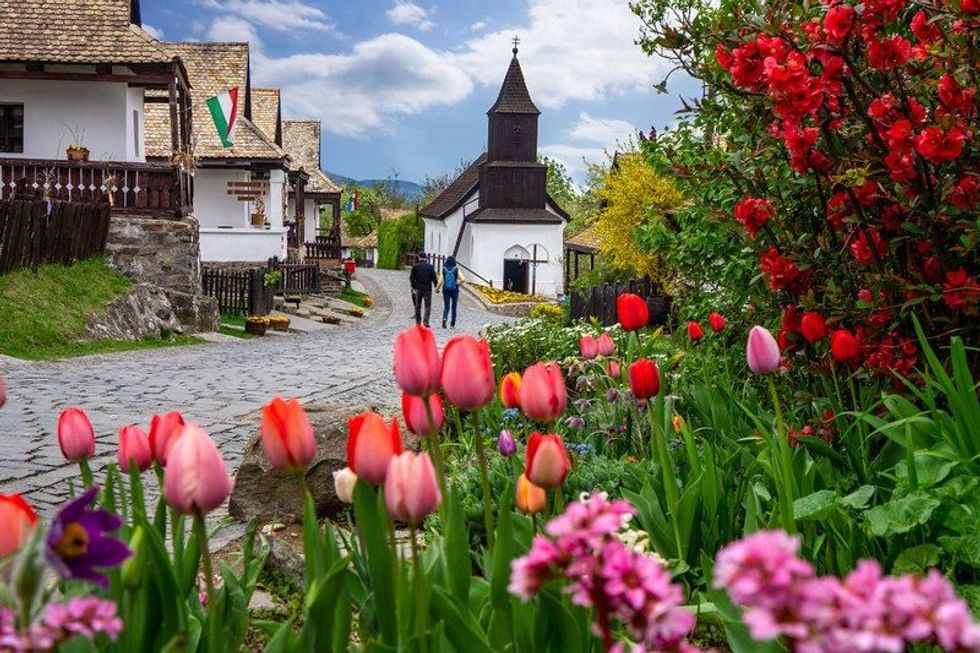103 Eastern European Last Names With Meanings

Eastern Europe is one of the most beautiful regions on the Earth and the people there have some amazing names.
To understand any famous name meaning in this region, basic knowledge of Slavic languages is extremely important. A large number of parents here will rank different names from Slavic languages to determine the first name of the baby as the surname can not be changed.
Did you know when it comes to the root of names, There are variants of the same root in almost all languages across Europe!
Read this article to know more about popular family names used in Eastern Europe.
Common Eastern European Last Names
Names carry a lot of meaning and serve as a gateway into our personalities. A name is something very personal and can mean a lot to its owner. Some names carry deep meaning while others are pleasing to hear. Here is a list of famous and common Eastern European last names.
Abakumov (Russian origin), meaning ‘embrace' is derived from the Hebrew word 'Habakkuk' and is a great Eastern European last name for any person.
Agafonov (Russian origin), meaning 'kindness' is derived from the Greek word 'Agathon'. This name will go well with any first name.
Alexeyev (Russian origin), meaning 'Defender' is derived from the Greek word 'Alexey'. A good last name for a common person.
Andreyev (Russian origin), meaning 'manly' is derived from the Greek word 'Andrew'.
Artyomov (Russian origin), meaning 'Son of Artyom' is derived from the Greek Goddess Artemis.
Aslananov (Russian origin), meaning 'Son of Aslan' is derived from the Turkish word 'Aslan'.
Balakin (Russian origin), meaning 'to chatter' is a good Russian last name.
Balandin (Russian origin), meaning ‘a crater on the moon' is a good Russian family name.
Baranov (Russian origin), meaning 'lamb' is a popular surname in Russia. It will go well with any first name.
Barinov (Russian, origin) meaning 'nobleman' is derived from the word 'Boyar'. Suitable with any first name.
Bocharov (Russian origin), meaning 'copper’ is derived from the name 'Boris' and is an occupation-based surname.
Bogdanić (Croatian origin), meaning 'son of Bogdan' is a popular Eastern European last name.
Borisyuk (Russian origin), meaning 'wolf' is a derivation of the name 'Boris' and is a unique Eastern European family name
Borodin (Russian origin), meaning 'Beard' originated from the word 'Boroda'. One of the common surnames from Slavic languages.
Borovkov (Russian origin), meaning 'small boar' is derived from the word 'Borov'.
Bortnik (Russian origin), meaning 'beekeeper' is an occupation-based name and is derived from 'Bortniki'.
Bortsov (Russian origin), meaning 'wrestler', is derived from the word 'Borets'. A great nickname.
Broz (Croatian origin) is derived from Ambrozije and is a common Eastern European last name.
Burgrov (Russian origin) meaning 'heap' is a derivation of the word 'Bugor'. One of the common surnames in Hungary.
Bychkov (Russian origin) meaning 'bull' is derived from the Russian word 'Bychok'.
Crnčević (Serbian origin), meaning 'black' is a unique Eastern European last name.
Dragović (Croatian origin), meaning 'son of Drago' is a good Eastern European last name.
Filipović (Serbian origin), meaning ‘son of Filip’ is a good Eastern European last name.
Franić. (Croatian origin), is derived from Franjic and is a good Eastern European surname.
Franjić (Croatian origin), meaning 'son of Franjo' is one of the oldest last names.
Gál (Hungarian origin), meaning 'wave' is said to be derived from the Hebrew word 'Gál'. One of the popular diminutive surnames in Hungary.
Grbić (Slovak origin), meaning ‘hunchback’ is an older Slavic surname from the 19th century.
Grgić (Croatian origin), meaning 'son of Grgur' is a good Eastern European diminutive surname.
Horváth (Hungarian origin), meaning 'Croatian' is derived from the Hungarian word 'Horvat’. Sounds like a great nickname.
Juhász (Hungarian origin), meaning 'sheep' is derived from 'Juh' meaning shepherd, and is an occupational name.
Kiss (Hungarian origin), meaning 'little' is a good Eastern European diminutive family name. Popular in Germany as well.
Kovács (Hungarian origin), meaning ‘Smith’ is the second most popular Hungarian name and is an occupational one, and is a great Eastern European last name.
Lakatos (Hungarian origin), meaning ‘locksmith’ is an occupational Eastern European family name.
Stankić (Serbian origin), meaning 'son of Stanko' is an old Eastern European surname.
Stjepanić (Croatian origin), meaning 'son of Stjepan' is a great Eastern European last name.
Tomić (Serbian origin), meaning 'son of Toma' is an older Eastern European family name.
Vinković (Croatian origin), meaning 'son of Vinko' is an older Eastern European surname.
Vlahović (Croatian origin), meaning 'Romanian', is a derivative of the word Vlah.
Zorić (Serbian origin), meaning 'son of Zora' is an older Eastern European diminutive surname.
Eastern European Jewish Last Names
Jewish names are very unique and some of them are occupation-based names. There are often common patterns that can be found in these names as well.
Some of them are based on historical occupations that people with that particular last name used to follow. Blacksmith, Dimitrov, and Miller are popular choices. Here is a list of common Eastern European Jewish last names.
Ackerman (Jewish origin), meaning ‘plowman’ is an occupational Eastern European Jewish surname.
Baker/Boker (Jewish origin) meaning ‘baker’ is an occupational Eastern European Jewish last name.
Blecher (Jewish origin), meaning ‘tinsmith’ is an occupational Eastern European Jewish surname. It is popular in Germany as well.
Drucker (Jewish origin), meaning ‘printer’ is an occupational Eastern European Jewish last name.
Einstein (Jewish origin), meaning ‘mason’ is an occupational Eastern European Jewish last name.
Farber (Jewish origin), meaning ‘painter’ is an occupational Eastern European Jewish last name.
Feinstein (Jewish origin), meaning ‘jeweler’ is an occupational Eastern European Jewish last name.
Fisher (Jewish origin), meaning ‘fisherman’ is an occupational Eastern European Jewish last name.
Fleisher (Jewish origin), meaning ‘butcher’ is an occupational Eastern European Jewish last name.

Good Eastern European Last Names
Eastern European names come from a variety of countries like Serbia, Latvia, Russia, Bulgaria, Hungary, and more. This part of the world has some amazing and unique last names that are specific to their languages and dialects. This section contains a list of good Eastern European last names.
Adamić (Croatian origin), meaning ‘son of Adam’ is an old and good Eastern European last name.
Adrian (Latvian origin), meaning 'Adria' is a good Eastern European last name for a person with a proud family tree.
Aleksis (Latvian origin), meaning 'helper of man' is a good Eastern European last name.
Andrysiak (Polish origin), meaning 'son of Andrzej' is an Eastern European last name from Poland.
Antić (Serbian origin), meaning 'son of Anto' is a good and meaningful Eastern European last name.
Armands (Latvian origin), meaning 'soldier' is derived from Armand.
Artjoms (Latvian origin), meaning 'follower of Artemis' is derived from Artemus and is a unique Eastern European last name.
Arturs (Latvian origin), meaning 'strong as a bear' is derived from Artur and is a powerful Eastern European last name.
Babić (Serbian origin), meaning 'of an old woman' is a good Eastern European last name.
Balázs (Latin origin), meaning 'stammer', is derived from the Latin name Balázs.
Balogh (Hungarian origin), meaning 'left-handed', is derived from the word 'Bal' meaning 'Left' and is a great Eastern European last name.
Bartosz (Polish origin), is a good Eastern European last name and is derived from 'Bartosz'. A great name for a Polish descendant.
Bendiks (Latvian origin), meaning 'blessed one' is a beautiful Eastern European last name.
Bosko (Polish origin), meaning 'barefoot' is derived from the Slavic 'bosu' and is a great Eastern European last name.
Dziedzic (Polish origin), meaning 'land owner' is a good Eastern European last name.
Dzīve (Latvian origin), meaning 'life' is a good Eastern European last name.
Emils (Latvian origin), meaning 'eager' is a unique Eastern European last name.
Farkas (Hungarian origin), meaning 'the wolf' is a good Eastern European last name.
Fehér (Hungarian origin), meaning 'white haired' is a good Eastern European diminutive last name.
Fekete (Hungarian origin), meaning 'black' is said to symbolize hair color and is a good Eastern European last name.
Gomółka (Polish origin) is derived from the Polish word 'Gomółka', which is a type of round cheese and is a great Eastern European last name.
Gustavs (Latvian origin), meaning 'staff of the gods' is a religious Eastern European last name.
Horvat (Slovak origin), meaning 'Croatian' is a good Eastern European surname.
Ilić (Croatian origin), meaning 'son of Ilija' is a good Eastern European last name of older origin.
Ivanović (Croatian origin), meaning 'son of Ivan' is an older Eastern European last name.
Ivo (Latvian origin), meaning 'Archer', is an occupation-based Eastern European last name.
Janković (Serbian origin), meaning 'son of Janko' is a good Eastern European surname of older origin.
Jazeph (Latvian origin), 'God will increase' is derived from Joseph and is a religious Eastern European last name.
Jurgis (Latvian origin), meaning 'Earth worker', is an occupation-based Eastern European last name.
Kamiński (Polish origin), meaning 'stone' is an occupation-based name for stonecutter or sculptor and is a great Eastern European last name.
Kovačić (Bosnian origin), meaning 'blacksmith' is an occupation-based Eastern European last name.
Kristaps (Latvian origin), meaning 'Bearer of Christ' is a spiritual Eastern European last name.
Kristers (Latvian origin), meaning 'a disciple of Christ' is a good Eastern European last name.
Krists (Latvian origin), meaning 'follower of Christ' is a good Eastern European last name.
Labrencis (Latvian origin), meaning 'laurel' is derived from Lawrence.
Lončar (Bosnian origin), meaning 'potter' is an occupation-based surname from Eastern Europe.
Marković (Serbian origin), meaning 'son of Marko' is an older Eastern European last name.
Nikolić (Serbian origin), meaning 'son of Nikola' is an Eastern European last name of older origin.
Novak (Slovak origin), is a name given to a newcomer and is a good Eastern European last name.
Perko (Slovak origin), is an ancient Eastern European last name that is derived from 'Peter'.
Petrić (Croatian origin), meaning 'son of Petar' is an older Eastern European last name.
Pokorný (Czech origin), meaning 'humble' is a good Eastern European last name from the Czech Republic.
Polák (Czech origin), meaning 'from Poland', is a good Eastern European diminutive last name from the Czech Republic.
Řezník (Czech origin), meaning 'butcher' is an occupation-based Eastern European last name.
Růžička (Czech origin), meaning 'little rose' is a good Eastern European last name.
Ryba (Czech), meaning 'fish' is an occupation-based name given to a fisherman and is a great Czech last name.
Long Eastern European Last Names
Everyone that likes unique names knows that some names are quite long. These names are very interesting as they can carry power. This section contains a list of long Eastern European last names.
Aleksandrs (Latvian origin), meaning 'defender of men' is a unique Eastern European last name for any person.
Arkhangelsky (Russian origin), meaning 'from Arkangelsk' is a district in Russia and is a great Russian last name.
Balabanov (Russian origin), meaning 'hawk' is a common Russian last name and is a powerful one.
Cooperman (Jewish origin), meaning ‘coppersmith’ is an occupational Eastern European Jewish last name suitable for any ethnic person from the old kingdom.
Dubanowski (Polish origin), is used for someone from the town of Duninowo in Poland and is an ethnic Polish last name popular with the local population.
Kazimieras (Latvian origin), meaning 'peace destruction' is an ethnic Eastern European last name.
Podsedník (Czech origin), meaning 'one sitting behind' is a good Eastern European last name from the Czech Republic.
Ślusarski (Polish origin), meaning 'locksmith' is an occupational name and is derived from the German 'ślusarz' and is a great Eastern European last name. Thus a great name for the Germanic population,
Stojanović (Serbian origin), meaning 'son of Stojan' is an older Eastern European last name from the old kingdom.
We Want Your Photos!
More for You
See All
Bachelor of Arts specializing in English Literature

Akinwalere OlaleyeBachelor of Arts specializing in English Literature
As a highly motivated, detail-oriented, and energetic individual, Olaleye's expertise lies in administrative and management operations. With extensive knowledge as an Editor and Communications Analyst, Olaleye excels in editing, writing, and media relations. Her commitment to upholding professional ethics and driving organizational growth sets her apart. She has a bachelor's degree in English Literature from the University of Benin, Edo State.
Bachelor of Science specializing in Microbiology, Masters of Science specializing in Biotechnology

Pratiti NathBachelor of Science specializing in Microbiology, Masters of Science specializing in Biotechnology
A Master's in Biotechnology from Presidency University and a Bachelor's in Microbiology from Calcutta University. Pratiti holds expertise in writing science and healthcare articles, and their inputs and feedback help writers create insightful content. They have interests in heritage, history, and climate change issues and have written articles for various websites across multiple subjects. Their experience also includes working with eco-friendly startups and climate-related NGOs.
Disclaimer
1) Kidadl is independent and to make our service free to you the reader we are supported by advertising. We hope you love our recommendations for products and services! What we suggest is selected independently by the Kidadl team. If you purchase using the Buy Now button we may earn a small commission. This does not influence our choices. Prices are correct and items are available at the time the article was published but we cannot guarantee that on the time of reading. Please note that Kidadl is a participant in the Amazon Services LLC Associates Program, an affiliate advertising program designed to provide a means for sites to earn advertising fees by advertising and linking to Amazon. We also link to other websites, but are not responsible for their content.
2) At Kidadl, we strive to recommend the very best activities and events. We will always aim to give you accurate information at the date of publication - however, information does change, so it’s important you do your own research, double-check and make the decision that is right for your family. We recognise that not all activities and ideas are appropriate for all children and families or in all circumstances. Our recommended activities are based on age but these are a guide. We recommend that these ideas are used as inspiration, that ideas are undertaken with appropriate adult supervision, and that each adult uses their own discretion and knowledge of their children to consider the safety and suitability. Kidadl cannot accept liability for the execution of these ideas, and parental supervision is advised at all times, as safety is paramount. Anyone using the information provided by Kidadl does so at their own risk and we can not accept liability if things go wrong.
3) Because we are an educational resource, we have quotes and facts about a range of historical and modern figures. We do not endorse the actions of or rhetoric of all the people included in these collections, but we think they are important for growing minds to learn about under the guidance of parents or guardians.







